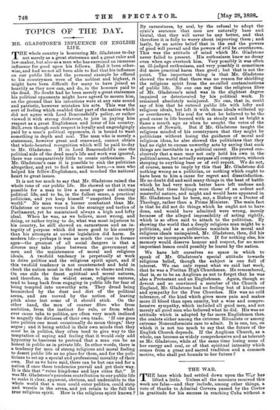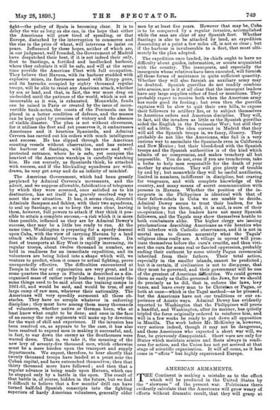THE WAR. T HE haze which had settled down upon the
IVL>,r has lifted a little. Unless all the accounts received this week are false—and they include, among other things, a vote of thanks to Admiral Cervera passed by the Cortes in gratitude for his success in reaching Cuba without a fight—the policy of Spain is becoming clear. It is to delay the war as long as she can, in the hope that either the Americans will grow tired of spending, or that Europe, disturbed by the interruption to commerce and the rise in the price of wheat, will intervene to insist on peace. Influenced by these hopes, neither of which are, in our judgment, well founded, the Government of Madrid have despatched their best, if it is not indeed their only, fleet to Santiago, a fortified and landlocked harbour, where they calculate it will be safe, and will at the same time provide the American Fleet with full occupation. They believe that Havana, with its harbour studded with explosive mines, its fortresses armed with Krupp guns, and its barracks occupied by eighty thousand regular troops, will be able to resist any American attack, whether by sea or land, and that, in fact, the war must drag on undecided until the patience of the world, which is not so immovable as it was, is exhausted. Meanwhile, funds can be raised in Paris or created by the issue of incon- vertible bank-notes, the coasts of the Peninsula can be placed in a better condition of defence, and the masses can be kept quiet by promises of victory and the absence of visible disaster. The plan is not without cleverness, for it utilises the fleet and yet preserves it, it embarrasses Americans and it heartens Spaniards, and Admiral Cervera has carried out his orders with much intelligence and success. He has slipped through the American scouting vessels without observation, and has entered the harbour of Santiago, with its narrow and well- protected entrance, where he is safe, yet occupies the heaviest of the American warships in carefully watching him. He can scarcely, as Spaniards think, be attacked with success, and if the blockading squadrons are with- drawn, he may get away and do an infinity of mischief.
The American Government, which had been greatly perplexed by Admiral Cervera's movements, and the adroit, and we suppose allowable, falsification of telegrams by which they were screened, once satisfied as to his destination, has set itself in a gravely resolved way to meet the new situation. It has, it seems clear, directed Admirals Sampson and Schley, with their two squadrons, to seal up Santiago, so as to keep the seas clear, leaving them, however, full powers to attack if they think it pos- sible to attain a complete success,—a risk which it is more than possible, inflamed as they are by Admiral Dewey's success, they may be a little too ready to run. At the same time, Washington is preparing for a speedy descent upon Cuba, with the view of carrying Havana by a land attack while Admiral Cervera is still powerless. Its fleet of transports at Key West is rapidly increasing, its regular troops, about twelve thousand in number, are held in readiness for an immediate expedition, and its volunteers are being licked into a shape which will, we venture to predict, when it comes to actual fighting, prove unexpectedly effective. The difficulties encountered at Tampa in the way of organisation are very great, and in some quarters the army in Florida is described as a dis- organised mass of rather rowdy loafers ; but precisely the same things used to be said about the training camps in 1861-65, and would be said, and would be true, of any large camp of raw men, whatever their nationality. The Americans will very speedily surmount all those ob- stacles. They have no scruple whatever in enforcing discipline ; they must have among them many thousands of volunteers, whether native or German born, who at least know what ought to be done; and once in the face of an enemy the raw regiments will make up by devotion for the want of skill and experience. If the invasion has been resolved on, as appears to be the case, it has also been resolved to expend men in making it successful, and, in fact, to war down the enemy as the Southerners were warred down. That is, we take it, the meaning of the new levy of seventy-five thousand men, which otherwise must be a mere burden upon the transport and supply departments. We expect, therefore, to hear shortly that twenty thousand troops have landed at a point near the Cuban capital, and have entrenched themselves; then that thirty thousand more have followed ; and then that a regular advance is being made upon Havana, which can be stopped only by a battle in the open. The result of that battle is, of course, hidden in the future, but we find it difficult to believe that a few months' drill can have turned half-fed Spanish conscripts into the fighting superiors of hardy American volunteers, generally older men by at least five years. However that may be, Cuba is to be conquered by a regular invasion, accomplished while the seas are clear of any Spanish fleet. Whether Santiago is also to be attacked by land, an expedition descending at a point a few miles off, is not so clear ; but if the harbour is invulnerable to a fleet, that must ulti- mately be the plan adopted.
The expedition once landed, its chiefs ought to have no difficulty about guides, information, or scouts acquainted with the country. The insurgents, and especially the insurgents whose relatives have been executed, will furnish all those forms of assistance in quite sufficient quantity. Whether they will also furnish an auxiliary army may be doubted. Spanish guerillas do not readily combine into armies, nor is it at all clear that the insurgent leaders have any large supplies either of food or munitions. They probably expect to receive both when the American army has made good its footing ; but even then the guerilla, captains will be slow to quit their own hills, to expose their followers to artillery fire, or to subject themselves to American orders and American discipline. They will, in fact, aid the invaders as little as the Spanish guerillas aided the English in the Peninsular War ; but still they will aid a little. The idea current in Madrid that they will aid the Spanish troops is, we fancy, illusory. They probably do not like the Americans, who fail in a very curious way to assimilate the Spaniards even in California and New Mexico ; but their blood-feud with the Spanish troops and the Spanish authorities is of the kind which admits of no compromise, and makes treachery all but impossible. You do not, even if you are treacherous, take a bribe to help men responsible for the death of your mother by starvation. They will give plenty of trouble by and by; but meanwhile they will be useful auxiliaries, limited in numbers, indifferent in discipline, but craving for vengeance, and with complete knowledge of the country, and many means of secret communication with persons in Havana, Whether the position of the in- surgents in the Philippines is identical with that of their fellow-rebels in Cuba, we are unable to decide.. Admiral Dewey seems to trust their leaders, for he is helping to arm them, and, it is said, is sure of their co-operation ; but the leaders have not many Spanish followers, and the Tagals may show themselves hostile to both combatants alike. The higher clergy are issuing proclamations describing Americans as vile heretics who will interfere with Catholic observances, and it is not in mortal man to discern accurately what the Tagals* religious ideas really are. A village in uproar will pros- trate themselves before the cura's crucifix, and then vivi- sect the cura for some real or fancied oppression, probably ending their outburst by some utterly Pagan ceremonial inherited from their fathers. Their total action, especially in the smaller islands, cannot be predicted ; but it is certain, if civilisation is not to disr.ppear, that they must be governed, and their government will be one of the greatest of American difficulties. We could govern them as easily as Gallio governed the Jews, for we should do precisely as he did, that is, enforce the laws, levy taxes, and leave every man to be Christian or Pagan, or both at once—which is the Tagal method—as he pleased; but the Americans have not our traditions or our ex- perience of Asiatic ways. Admiral Dewey has evidently reported to Washington that the Philippines will prove a handful, and Washington, after its manner, has quietly tripled the force originally ordered to reinforce him, and will in a few weeks be ready to put down all opposition in Manilla. The work before Mr. McKinley is, however, very serious indeed, though it may not be dangerous, and those Americans who expected a short war will, we fear, be grievously disappointed. Short wars are only for States which maintain armies and fleets always in readi- ness for action, and the Union has not yet arrived at that stage of scientific organisation. It will all come, as it has come in " effete " but highly experienced Europe.



































 Previous page
Previous page